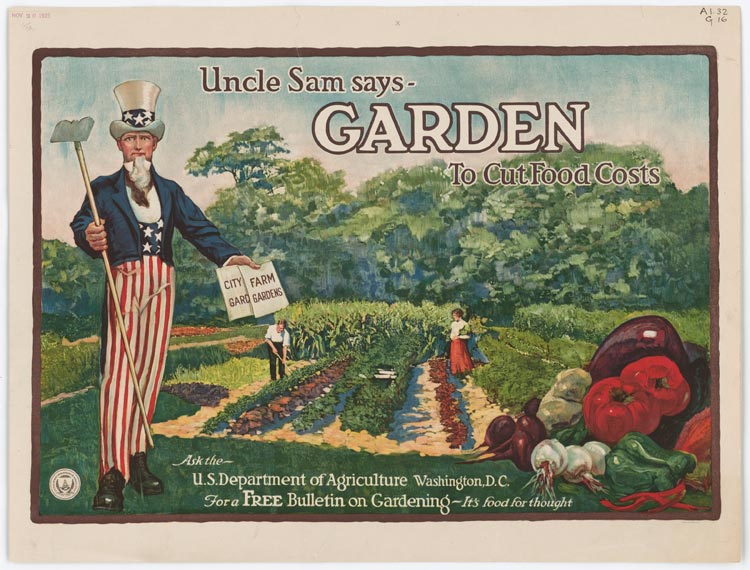 |
| "Uncle Sam says Garden to Cut Food Costs" - 1917 |
World War I marks a serious shift in the food system of the United States. It provides some insight into the current state of affairs, as well as some insight into how we should approach a rethinking of the future.
We can consider the Great War as the point of foundation for modern agriculture in this country, shifting the priority to production of particular commodities - sugar beets, corn, and soybeans. Perhaps a transition point from small, family subsistence-level farms to more mechanized and commercial production.
At the same time, World War I, the ensuing Great Depression, and World War II all represent periods of great economy. Besides war-time rations, abstaining from sugar, wheat, and meat in the name feeding the troops was seen as a patriotic act, contributing to the war effort. For example, home gardens - or "Victory Gardens" as they were called by First Lady Eleanor Roosevelt - were offered as a solution to feed a family, cut costs, and leave other crops to feed the troops. On this same vein, ad campaigns advocated for reducing waste in the kitchen, positioning economical use of all food as a contribution to the war effort.

These latter two points are particularly salient for our current approach to food and agriculture in the country. We do not presently understand the concept of moderation and frugality. According to the UN Food and Agriculture Organization, of the food wasted in industrialized nations, it is primarily in its post-processed form on the grocery shelves or the dining room table. Taking a lesson from the restraint exercised during the earlier part of the 20th century would benefit the country as a whole.
As for gardens...well, I'm a big advocate of growing one's own food and consuming locally and seasonally. But more significantly, during World War I, Americans were still within easy reach of agrarian roots and rural lifestyles. Now, the resurgence of home gardens not only provides some food, but also reconnects people (particularly ubranites) to the land and the source of their food. Perhaps we should take some cues from our country's past interactions with agricultural production and how well patriotism tied in with food production.
Next time, taking on food guidelines!
No comments:
Post a Comment